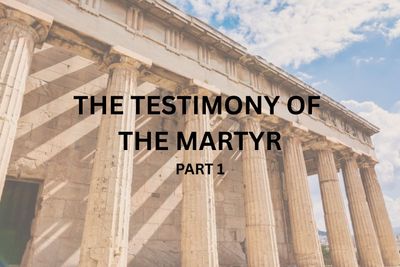The Testimony of a Martyr (Part 1)
Tradition and historical consensus suggest that the Apostle Paul was martyred no earlier than 64 AD and as late as 67 AD by beheading (consistent with his Roman citizenship) in Rome during Nero's reign.1 While specific details of his martyrdom are described in later non-scriptural accounts, his own writings in 2 Timothy suggest that he anticipated his death, and early Christian figures, such as Clement and Eusebius, testify to his martyrdom.
In pursuit of his B.A. and later M.A., Martin Luther enrolled at the University of Leipzig in 1501. That July, he joined the Hermits of St. Augustine in fulfillment of a vow he had made to God after surviving a lightning strike. After being ordained a priest, his order transferred Luther to the University of Wittenberg in 1508, where he lectured on moral theology until he earned a doctorate in 1512. Throughout his education, Martin Luther wrestled with the problem of his own salvation. He dutifully studied theology, attended confession, and performed penance, as well as all the other requirements of the Church.
Between 1514 and 1518, through careful study of Romans and Galatians, he concluded that, despite his efforts, he was still a sinner who could not save himself. With no Damascus road experience or any outside help, he trusted Jesus Christ as his Savior in the quiet of his own study, a respected churchman and theologian, who finally became a Christian.
On October 31, 1517, Luther nailed his famous 95 Theses to the door of the Castle church at Wittenberg, quietly starting the Protestant Reformation. Thesis #62 states, “The true treasure of the church is the most holy gospel of the glory and grace of God.”2 Luther found righteousness in God’s grace. “The righteousness of another, instilled from without, the righteousness of Christ by which he justifies through faith.”3
The church owes much to Paul. What does the church today owe to Martin Luther and the other Reformers? What does the church now owe to Charlie Kirk? More importantly, what will the church owe to you? The single most important contribution of the Reformers was to lift up the Holy Scriptures and restore, again, the biblical doctrine of justification by faith alone. Everything Luther did was dependent upon his understanding of God’s truth from the pen of the rabbi from Tarsus.
Sometimes we think that unless conversion looks like events on the Damascus road, it isn’t valid. Luther demonstrates that God has no specific format…no pattern to which coming to faith must conform. Some experience salvation in Christ at church; others at home, talking with parents. Some come to a saving faith at an evangelistic crusade, sitting in a coffee shop, and others from a podcast. Despite various formats, the Gospel message is the same: we need a Savior, our own righteousness cannot save us, and dependency on God and faith in the finished work of Christ through God’s grace – this alone produces eternal life.
In chapter 21, Luke begins the final lap of his record in which he will take Paul from the Asian coast to Rome via Jerusalem and Caesarea. The trial has started, and Paul will be a prisoner, or at least under guard, for the rest of his book. Here we find no lack of excitement for the rest of Acts, but we hear of no more missionary journeys, no more prayer meetings with brothers and sisters in Christ, and no more evangelistic sermons appealing to Gentiles. The events of the last 6 chapters consume four years of Paul’s life, teaching him patience and dependence on the Lord; lessons we would do well to learn from reading about his experiences.
“Brothers and fathers, listen now to my defense before you.” When they heard that he was addressing them in Aramaic, they became even quieter. He continued, “I am a Jew, born in Tarsus of Cilicia but brought up in this city, educated at the feet of Gamaliel according to the strictness of our ancestral law. I was zealous for God, just as all of you are today. I persecuted this Way to the death, arresting and putting both men and women in jail, as both the high priest and the whole council of elders can testify about me. After I received letters from them to the brothers, I traveled to Damascus to arrest those who were there and bring them to Jerusalem to be punished.” (Acts 22:1-5)
Paul is courageous and clearly articulates how Christ drew him to salvation. He also explains his attempts to follow God’s will and do God’s work. In the face of murderous mobs and cruel interrogations of Rome, he remains calm and clear, knowing the will of God will be carried out. From this we learn courage, clarity of witness, and commitment to God’s call on our life…even to the point of martyrdom! Stay tuned, as next month I will break down the different aspects of Paul’s identity…an identity that earned him the right to be called a martyr for the faith!
1F.F. Bruce, Paul Apostle of the Heart Set Free (Grand Rapids: Eerdmans, 1977), 444.
2http://reverendluther.org/pdfs/The_Ninety-Five_Theses.pdf.
3Robert Kolb, Luther on the Two Kinds of Righteousness: “Reflections on His Two-Dimensional Definition of Humanity at the Heart of His Theology” (Lutheran Quarterly, Vol. XIII, 1999) https://gudribassakums.wordpress.com/wp-content/uploads/2012/10/1999-luther-2kr-kolb.pdf.


